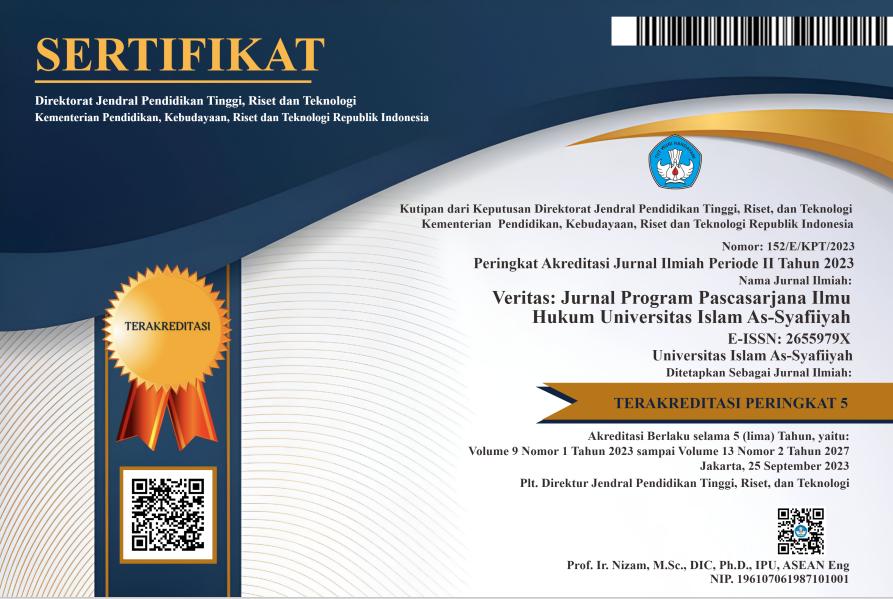PERBANDINGAN SISTEM PEMBUKTIAN DALAM PENYELESIAN SENGKETA DI LEMBAGA PERADILAN
Abstract
proof is the process of discovering the truth of a legal relationship and the
existence of a concrete legal event has actually taken place. The judge as the main
executor of the judiciary to uphold law and justice in addition to basing on the
provisions of material law which is the basis of dispute, is also bound to implement
the provisions of formal law which is also substantive, so it is obliged to conduct
investigation on the evidences presented by the parties. The process of
investigating the evidence that strengthens the arguments or arguments of the law,
something that can convince the truth of a proposition or establishment. While the
evidence is anything that the law can use to prove it. The evidence that can be used
in proof depends on the system of evidence held by both the legal system and the
legal system it embraces. Thus, the proofing process as a decisive essential process
for the justice seekers fulfilled their legal interests and for judges is to find, enforce
and apply the law justly to the justice seeker's justice. Implementing the correct
proof process according to material law and formal law will help the judge to
formulate a legal opinion or legal consideration (ratio desidendi) to determine the
attitude or legal standing to decide or sentence a case.
References
____________, Hukum Acara Pidana Indonesia, Edisi Revisi, Jakarta: Sinar Grafika, 2001.
Ansori Sabuan, dkk., Hukum Acara Pidana, Bandung: Angkasa, 1990.
Bambang Sutiyoso, Metode Penemuan Hukum, Cet 2, Yogyakarta: UII Press, 2007.
Cound, C.S. John J., Civil Procedure: Cases & Material, St. Paul Minn: West Publishing, 1985.
H. Riduan Syahrani, Buku Materi Dasar Hukum Acara Perdata, Bandung: Citra Aditya Bakti, 2004.
Martiman Prodjohamidjojo, Komentar Atas KUHAP: Kitab Undang-Undang Hukum Acara Pidana, Jakarta: Pradnya Paramitha, 1984.
Maruarar Siahaan, Hukum Acara Mahkamah Konstitusi Republik Indonesia,Edisi 2, Jakarta: Sinar Grafika, 2012.
Munir Fuady, Teori Hukum Pembuktian, Cet I, Bandung: P.T. Citra Aditya Bakti, 2006.
Retnowulan Sutantio dan Iskandar Oeripkartawinata, Hukum Acara Perdata Dalam Teori dan Praktek, Cet. X, Bandung: C.V. Mandar Maju, 2005.
Roihan A. Rasyid, Hukum Acara Peradilan Agama, Jakarta: Raja Grafindo Persada, 1995.
R. Subekti, Hukum Pembuktian, Cet. Ke-12, Jakarta: Pradnya Paramita 1999.
R. Subekti dan Tjitrosoedibio, Kamus Hukum, Cet. XII, Jakarta: Pradnya Paramita, 1996.
R. Soepomo, Hukum Acara Perdata Pengadilan Negeri, Jakarta: P.T. Pradnya Paramita, 1994.
Sudikno Mertokusumo, Hukum Acara Perdata Indonesia, Edisi Ketujuh, Yogyakarta: Liberty, 2006.
Wirjono Prodjodikoro, Hukum Atjara Pidana di Indonesia, Jakarta: Sumur Bandung, 1967.
Yahya Harahap, Pembahasan Permasalahan dan Penerapan KUHAP, Jakarta: Pustaka Kartini, 1993.
Zairin Harahap, Hukum Acara Pengadilan Tata Usaha Negara, Jakarta: Raja Grafindo Persada, 2005.
Herzien Inlandsch Reglement, jo. Rechtreglement voor de Buitengewesten.
Undang-undang Nomor 8 Tahun 1981 tentang Hukum Acara Pidana.
Undang-undang Nomor 5 Tahun 1986 tentang Peradilan Tata Usaha Negara
sebagaimana diubah dua kali dengan Undang-undang Nomor 9Tahun 2004, jo. Undang-undang Nomor 51 Tahun 2009.
Undang-undang Nomor 24 Tahun 2003 tentang Mahkamah Konstitusi sebagaimana diubah dengan Undang-undang Nomor 8Tahun 2011.




